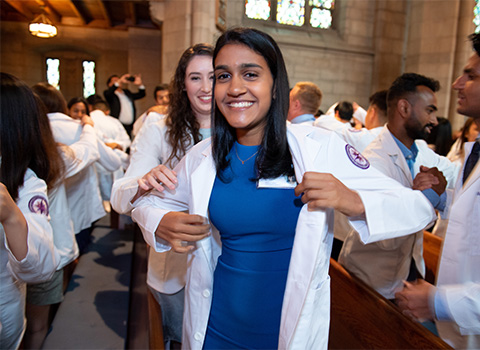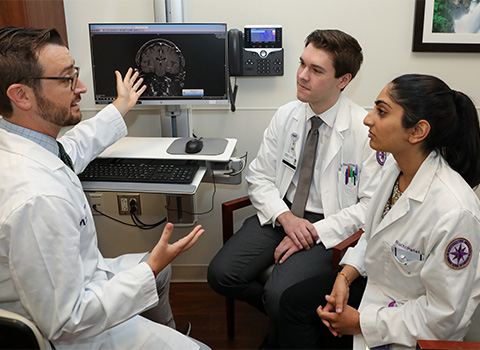Characteristics of the Successful Candidate
Northwestern University Feinberg School of Medicine holistically reviews candidates and selects applicants for admissions who possess the aptitude, integrity, and personal and emotional characteristics necessary for them to become competent and compassionate physicians who are able to serve the needs of a diverse and changing world.
Accepted applicant characteristics: meaningful exploration of medicine, academic preparedness, inquiry-driven, service orientation and altruism, professionalism (honesty and integrity), effective communication and interpersonal skills, maturity, commitment, persistence, team player, and leadership skills.
Exploration of Medicine/Motivation for Medicine
Our candidates should have experiences that allow them to explore the field of medicine with depth and breadth, and demonstrate their desire to contribute to patient care and/or discovery to better the lives of their future patients.
Science Competencies (AAMC)
- Living Systems: Applies knowledge and skill in the natural sciences to solve problems related to molecular and macro systems including biomolecules, molecules, cells, and organs.
- Human Behavior: Applies knowledge of the self, others, and social systems to solve problems related to the psychological, socio-cultural, and biological factors that influence health and well-being.
Breadth, depth, and exploration of diverse experiences in medicine, along with reflections of these experiences and ability to communicate genuine passion for patient care and/or discovery, will be assessed. Such experiences could include but not be limited to shadowing, scribe, helping care within their family or home, clinical or hospital volunteering, emergency medical technician.
The Exploration of Medicine/Motivation for Medicine applicant characteristics support the Patient-Centered Medical Care competency within Feinberg’s competency-based education framework.
Explore the Patient-Centered Medical Care competency on MD EducationEffective Communication and Interpersonal Skills
Our candidates should demonstrate an ability to communicate (written and oral) effectively for their future effective communication in a clinical setting.
- Social Skills: Demonstrates an awareness of others’ needs, goals, feelings, and the ways that social and behavioral cues affect peoples’ interactions and behaviors; adjusts behaviors appropriately in response to these cues; treats others with respect. (AAMC)
- Oral Communication: Effectively conveys information to others using spoken words and sentences; listens effectively; recognizes potential communication barriers and adjusts approach or clarifies information as needed. (AAMC)
- Written Communication: Effectively conveys information to others using written words and sentences. (AAMC)
Effective communication and interpersonal skills will be assessed through the application materials including the personal statement, letters of recommendation, along with the interviews.
The Effective Communication and Interpersonal Skills applicant characteristics support the Effective Communication and Interpersonal Skills competency within Feinberg’s competency-based education framework.
Explore the Effective Communication and Interpersonal Skills competency on MD EducationAcademic Preparedness and Excellence
Our candidates require the knowledge and skills necessary to be successful in undergraduate medical education and prepared for graduate medical education. These candidates will be able to accumulate scientific knowledge, diagnostic acumen, and the technical and interpersonal skills required for competent patient care.
Thinking and Reasoning Competencies (AAMC)
- Critical Thinking: Uses logic and reasoning to identify the strengths and weaknesses of alternative solutions, conclusions, or approaches to problems.
- Quantitative Reasoning: Applies quantitative reasoning and appropriate mathematics to describe or explain phenomena in the natural world.
- Scientific Inquiry: Applies knowledge of the scientific process to integrate and synthesize information, solve problems and formulate research questions and hypotheses; is facile in the language of the sciences and uses it to participate in the discourse of science and explain how scientific knowledge is discovered and validated.
The undergraduate cumulative grade point average, undergraduate science grade point average, grade point trends, and the synthesis of Medical College Admissions Test (MCAT) score(s) make up part of the assessment of an applicant’s academic preparedness. Additional factors considered are post-graduate or post-baccalaureate performance, rigor of the coursework, along with experiences that contribute to critical thinking and decision making. Assessment of competency will include intellectual, technical, and cultural competency. All applicants must attest that they have read the NUFSM Technical Standards.
The Academic Preparedness and Excellence applicant characteristics support the Medical Knowledge and Scholarship competency within Feinberg’s competency-based education framework.
Explore the Medical Knowledge and Scholarship competency on MD EducationTeam Player, Leadership, and Cultural Competency
Our candidates should demonstrate the ability to work collaboratively with camaraderie, demonstrate leadership skills, build a safe and inclusive community where there are safe places to resolve conflicts, listen to others’ perspectives, accept shared responsibility, and make joint decisions inclusive of all involved.
- Cultural Competence: Demonstrates knowledge of socio-cultural factors that affect interactions and behaviors; shows an appreciation and respect for multiple dimensions of diversity; recognizes and acts on the obligation to inform one’s own judgment; engages diverse and competing perspectives as a resource for learning, citizenship, and work; recognizes and appropriately addresses bias in themselves and others; interacts effectively with people from diverse backgrounds. (AAMC)
- Teamwork: Works collaboratively with others to achieve shared goals; shares information and knowledge with others and provides feedback; puts team goals ahead of individual goals. (AAMC)
Ability to effectively work on teams and demonstrate leadership will be assessed through applicant materials, including applicant activities, and interviews. Our candidates will be assessed on their roles in extracurricular activities, ability to communicate and demonstrate qualities of an effective leader. Additional consideration of diverse lived experiences and experiences with underserved communities/populations will also be considered.
The Team Player, Leadership, and Cultural Competency applicant characteristics support the System Awareness and Team-Based Care competency within Feinberg’s competency-based education framework.
Explore the System Awareness and Team-Based Care competency on MD EducationCommitment, Persistence, and Maturity
Our candidates should demonstrate tolerance for stressful or changing situations, adaptability and persistence, even under difficult or stressful situations, and an ability to recover from setbacks.
- Resilience and Adaptability: Demonstrates tolerance of stressful or changing environments or situations and adapts effectively to them; is persistent, even under difficult situations; recovers from setbacks. (AAMC)
Personal awareness will be assessed through the supplemental/secondary application, along with the interviews.
The Commitment, Persistence, and Maturity applicant characteristics support the Personal Awareness and Self-Care competency within Feinberg’s competency-based education framework.
Explore the Personal Awareness and Self-Care competency on MD EducationService, Altruism, and Health Equity
Our candidates should hold a deep desire to care for others and serve their communities.
- Cultural Competence: Demonstrates knowledge of socio-cultural factors that affect interactions and behaviors; shows an appreciation and respect for multiple dimensions of diversity; recognizes and acts on the obligation to inform one’s own judgment; engages diverse and competing perspectives as a resource for learning, citizenship, and work; recognizes and appropriately addresses bias in themselves and others; interacts effectively with people from diverse backgrounds. (AAMC)
- Service Orientation: Demonstrates a desire to help others and sensitivity to others’ needs and feelings; demonstrates a desire to alleviate others’ distress; recognizes and acts on his/her responsibilities to society; locally, nationally, and globally. (AAMC)
Academic and extracurricular activities will be assessed, as well as responses to interview questions about the applicant’s professional and life goals of providing patient care.
The Service, Altruism, and Health Equity applicant characteristics support the Community Engagement and Service competency within Feinberg’s competency-based education framework.
Explore the Community Engagement and Service competency on MD EducationInquiry-Driven
Our candidates should possess a passion for learning, academic curiosity, and a firm commitment to their future practice of medicine.
- Capacity for Improvement: Sets goals for continuous improvement and for learning new concepts and skills; engages in reflective practice for improvement; solicits and responds appropriately to feedback. (AAMC)
Breadth, depth, and exploration of diverse academic and extracurricular interests along with knowledge and exploration of medicine will be assessed. Extracurricular experiences may include but not be limited to community service, cultural experiences, employment, arts, language, and team activities such as clubs and sports. Additionally, focused questioning about the motivations for medicine and the applicant’s current knowledge of medicine will occur during the interview.
The Inquiry-Driven applicant characteristics support the Continuous Learning and Quality Improvement competency within Feinberg’s competency-based education framework.
Explore the Continuous Learning and Quality Improvement competency on MD EducationProfessionalism
Our candidates should uphold honesty, integrity, accountability, and adherence to medical ethics as core tenets of the profession of medicine.
- Reliability and Dependability: Consistently fulfills obligations in a timely and satisfactory manner; takes responsibility for personal actions and performance. (AAMC)
- Ethical Responsibility to Self and Others: Behaves in an honest and ethical manner; cultivates personal and academic integrity; adheres to ethical principles and follows rules and procedures; resists peer pressure to engage in unethical behavior and encourages others to behave in honest and ethical ways; develops and demonstrates ethical and moral reasoning. (AAMC)
Effective understanding and communication of the importance of ethical behavior, honesty and professionalism in medicine will be assessed through the application materials and interview, including disclosure of institutional actions and completion of the criminal background check. Unethical behavior or dishonesty identified at any time through the application materials or interview will be considered in assessing candidate integrity.
The Professionalism applicant characteristics support the Professional Behavior and Moral Reasoning competency within Feinberg’s competency-based education framework.
Explore the Professional Behavior and Moral Reasoning competency on MD Education

